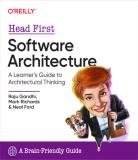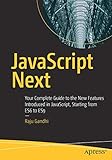Raju Gandhi
Founder, DefMacro Software
Raju is a software craftsman with almost 20 years of hands-on experience scoping, architecting, designing, implementing full stack applications.He provides a 360 view of the development cycle, is proficient in a variety of programming languages and paradigms, experienced with software development methodologies, as well an expert in infrastructure and tooling.
He has long been in the pursuit of hermeticism across the development stack by championing immutability during development (with languages like Clojure), deployment (leveraging tools like Docker and Kubernetes), and provisioning and configuration via code (toolkits like Ansible, Terraform, Packer, everything-as-code).
Raju is a published author, internationally known public speaker and trainer.
Raju can be found on Twitter as @looselytyped.
In his spare time, you will find Raju reading, playing with technology, or spending time with his wonderful (and significantly better) other half.
Presentations
Angular Workshop
9:00 AM MDT
Angular is a new JavaScript framework from Google. If you are looking into developing rich web applications, Angular is your friend. Angular embraces HTML and CSS, allowing you to extend HTML towards your application, and uses plain JavaScript which makes your code easy to reuse, and test. In this workshop we will start from the ground up, and build our way through a simple application that will let us explore the various constructs, and the familiarize ourselves with some of the new terminology in Angular.
In this workshop we will get down and dirty with Angular. In this workshop we will start with the very basics of how to boostrap our AngularJS application, and work slowly towards making REST-ful AJAX requests to a backend. List of topics include
- Bootstrapping an AngularJS application using
ng-app ng-initand the evaluation{{ }}directive- A brief look at
$rootScope ng-model- Controllers, Dependency Injection, and the View-Model (controller as syntax)
- Looping using
ng-repeat - Forms using
ng-form, form validation and submission in AngularJS - Angular provided filters and how to write our own
- Factories
- Making AJAX requests using
$http - Routing and route params using
$routeProviderand$routeParams
If time permits we will discuss a few good practices when working with AngularJS applications.
This is a hands on tutorial so bring your laptops!
What's new in JavaScript (ES 2020) Part I
8:30 AM MDT
JavaScript will celebrate it's 24th birthday in 2020. For a language that has been around for such a while it has seen very few, if any changes to the language itself. Well all that is about to change with ECMAScript.next (or ECMAScript 6). ECMAScript 6 modernizes JavaScript syntax, while bringing in features such as modules for better namespacing, class as a first class construct, and a variety of additional operators thus ensuring that JavaScript is ready for the next era of large scale modern web applications. ES 7, 8, 9 and now 10 all use the features introduced by ES6 to further the language.
In this session we will take a look at some of the features that ECMAScript 6 / 7 / 8 / 9 and 10 bring to the table. We will take an exploratory approach, and by the end of 3 hours, you will be well versed with ALL of the new features in JavaScript.
What's new in JavaScript (ES 2020) - Part II
10:30 AM MDT
JavaScript will celebrate it's 24th birthday in 2020. For a language that has been around for such a while it has seen very few, if any changes to the language itself. Well all that is about to change with ECMAScript.next (or ECMAScript 6). ECMAScript 6 modernizes JavaScript syntax, while bringing in features such as modules for better namespacing, class as a first class construct, and a variety of additional operators thus ensuring that JavaScript is ready for the next era of large scale modern web applications. ES 7, 8, 9 and now 10 all use the features introduced by ES6 to further the language.
In this session we will take a look at some of the features that ECMAScript 6 / 7 / 8 / 9 and 10 bring to the table. We will take an exploratory approach, and by the end of 3 hours, you will be well versed with ALL of the new features in JavaScript.
JavaScript Patterns Revisited
1:30 PM MDT
In this session we will look at some JavaScript patterns, and how you can use them within your code.
No longer can you think of JavaScript as a kiddie-scripting language. JavaScript has now been promoted to a first-class citizen within your application - and with this, comes the need to think of better abstractions, code re-use - even thinking of establishing a common vocabulary to discuss approaches to writing better, cleaner and ultimately more maintainable JavaScript code.
Regex for mortals
3:15 PM MDT
Jamie Zawinski once said “Some people, when confronted with a problem, think “I know, I'll use regular expressions.” Now they have two problems.“. Many consider regular expressions to be indecipherable, but the truth is that every programmer should consider regular expressions an integral part of their toolkit. From the command line to your favorite text editor, from parsing user input to scraping HTML pages - once you know regular expressions you will find a use for them in almost every programming context.
In this session we will attempt to unriddle the mystery that regular expressions pose. We will start at the basics and work our way towards more complex expressions.
Advanced Regular Expressions
5:00 PM MDT
You have used Regular Expressions before, and they don't faze you one bit. But you know lurking beneath is something even more powerful, and you want to know how to leverage that power. Well fear not! This is just the session you want. We will take a deep dive into Regular Expressions and walk away having understood how to truly take advantage of some of Regular Expressions more esoteric features.
You have used Regular Expressions before, and they don't faze you one bit. But you know lurking beneath is something even more powerful, and you want to know how to leverage that power. Well fear not! This is just the session you want. We will take a deep dive into Regular Expressions and walk away having understood how to truly take advantage of some of Regular Expressions more esoteric features.
Learning to Learn
8:30 PM MDT
In this session we will look to see how we can refactor our learning - what tools, and methodologies can we use to help us learn quicker and better - how we can create a store that gives us quick access to information when we really need it.
We all work in an industry in which not only do the tools that we use change ever few years, but one in which we have to shift the very paradigms these tools are built on! Even the most trivial of projects entails tens of different toolkits, frameworks, and languages coming together, and somehow we need to know how to leverage each one. How does one keep up? Despite all our years in schools, and our in-born nature to learn, we often are never taught how to learn. How can we learn faster, and retain even more?
In this session we will take a look at various tools and techniques available to us and see how we can make our learning effective.
Gradle from the Ground up
9:00 AM MDT
Gradle has fast become one of the de-facto build tool in the Java ecosystem. Gradle offers a powerful DSL to configure your builds. Whether you have a simple build, or a complex build with many moving parts, Gradle's DSL and extensible API can help you make your builds easier, and possible.
In this sessio we will start from the ground up. We will write our first Gradle script and examine Gradle's configuration vs. execution phases. We will see how Gradle uses plugins to add on functionality for free to your build and end with a look at the Gradle Plugin API to see how easy it is to write your own plugins for better reuse.
Gradle - Tips and Tricks
10:45 AM MDT
Gradle has fast become one of the de-facto build tool in the Java ecosystem. You might have used Gradle to build your project without realizing how much more Gradle has to offer. Up-to-date checking, automatic clean, file operations such as copy, move and zip and so much more are just some of the features that Gradle offers right out of the box.
In this session we will explore some of these features and how we can use them within our own builds.
Web Apps with AngularJS - Part I
1:30 PM MDT
In this session, we will take a look at Angular - the powerful MVVM SPA framework from Google. We will discuss some of the terminology that Angular offers, and see how we can use that to develop highly interactive, dynamic web applications. See “Detail” for a list of topics I cover and the Github repo URL
In this session we will take a look at Angular and using it to develop rich web applications. Angular embraces HTML and CSS, allowing you to extend HTML towards your application, and uses plain JavaScript which makes your code easy to reuse, and test.
Note: This is an intro level talk. It is targeted towards developers who are curious about Angular and want to learn about the fundamental features and concepts in Angular.
Topics Covered -
- Bootstrapping an AngularJS application using
ng-app ng-initand the evaluation{{ }}directive- A brief look at
$rootScopeand scoping rules ng-model- Controllers, Dependency Injection, and the View-Model
- Looping using
ng-repeat - Forms using
ng-form, form validation and submission in AngularJS ng-messagesto display form validation messages to the user- Angular provided filters and custom filters
GitHub URL - https://github.com/looselytyped/angudone-workshop/tree/solutions
Web Apps with AngularJS - Part II
3:15 PM MDT
In this session, we will take a look at Angular - the powerful MVVM SPA framework from Google. We will discuss some of the terminology that Angular offers, and see how we can use that to develop highly interactive, dynamic web applications. See “Detail” for a list of topics I cover and the Github repo URL
In this session we continue our discussion from Part I. As we continue to evolve our application we will seek to use, and understand a few more of AngularJS' core constructs.
- Factories and services
- Routing using
ng-viewand$routeProvider - AJAX calls to a backend using
$http
If time permits we will look at a few good practices when developing AngularJS applications, ways to modularize your code, and some tools that aid in the development of AngularJS applications.
Books
Head First Software Architecture: A Learner's Guide to Architectural Thinking
by Raju Gandhi
If you're a software developer looking for a quick on-ramp to software architecture, this handy guide is a great place to start. From the authors of Fundamentals of Software Architecture, Head First Software Architecture teaches you how to think architecturally and explores the unique challenges of software architecture. You'll learn the distinction between architecture and design and the relationship between code, components, and architectural styles. You'll also learn how to work with some common architectural styles through vivid, fun examples. Quick, easy, and entertaining, this book is a valuable introduction to the world of software architecture.Head First Git: A Learner's Guide to Understanding Git from the Inside Out
by Raju Gandhi
Many people who use Git rely on "recipes"--copying and pasting commands they find on the internet without really understanding how Git actually works. But what do you do if you find yourself in a tight spot? You can't simply wing it. With this unique hands-on guide, you'll learn the ways of Git and have fun while doing it. Raju Gandhi peels back the layers to reveal the simple yet powerful engine that powers Git, so you'll understand not just the how but the why. You'll master branches, merges, commit messages, search, utilities, and more; learn best practices for collaborative work; and unlock the full potential of Git.If you've read a Head First book, you know what to expect--a visually rich format designed for the way your brain works. If you haven't, you're in for a treat. With this book, you'll learn Git through a multisensory experience that engages your mind rather than a text-heavy approach that puts you to sleep.
JavaScript Next: Your Complete Guide to the New Features Introduced in JavaScript, Starting from ES6 to ES9
by Raju Gandhi
JavaScript has finally grown up. Armed with a slew of new features, JavaScript now makes writing the code that powers your applications elegant, concise, and easy to understand. This book is a pragmatic guide to the new features introduced in JavaScript, starting with Edition 6 of ECMAScript, and ending with Edition 9.
Using a "compare and contrast" approach, each chapter offers a deep dive into new features, highlighting how best to use them moving forward. As you progress through the book, you'll be offered multiple opportunities to see the new features in action, and in concert with one another.
Backed by an example-driven writing style, you'll learn by doing, and get ready to embrace the new world of JavaScript.
What You'll Learn
- Provide a deep exposition of the new features introduced in ES6 through ES9
- Review how JavaScript's new features by-pass any limitations of an existing approach
- Examine the refactoring necessary to go from old to new
- Demonstrate how JavaScript's new features work in unison with each other
Who This Book Is For
New and experienced developers who wish to keep abreast of the changes to JavaScript and deepen their understanding of the language.



